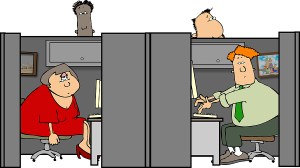Learning the Cubicle to Leave the Cubicle

One of the biggest downsides to working in a confined space in close quarters with your co-workers is that you can’t help but distract, and be distracted by, everyone around you. Since interruptions in this environment are constant, it is often necessary to prioritize your daily tasks so that you can remained focused on what needs to be done. By creating a proper inventory of your duties you’ll never be left wondering what you were doing before lunch and what you need to do right now.
Since you spend so much time sitting in your cubicle, your workspace should be personalized to make you feel most comfortable. Fill out empty wall space with pictures or other decorations that make you feel more at ease and at home. Use unneeded desk space for sentimental trinkets, picture frames, and other items that make you happy. If allowed, decorate your cubicle for holidays and other special days and generally try to create a space that generates a positive vibe.
For jobs requiring regular phone calls, don’t use speakerphone and try to talk in lower tones so not to force your conversations on everyone around you. Use a headset if one is available.
A big cubicle no-no is the holding of regular informal meetings at your desk. As with behavior with phone calls, be considerate to your workmates nearby and go somewhere else for non-work related meetings lasting more than a couple of minutes. Better yet, make friends with your neighbors so that you have a running casual conversation involving everyone in earshot and collaborate with them to reach work goals and to solve problems without needing to take them to management.
Watch what you say and how you say it. Since you are working in such close quarters, just because someone can’t be seen doesn’t mean that they can’t hear you. Utmost caution must be taken when making negative comments about work and your co-workers. The use of inappropriate language is also something to be avoided, especially around people you do not know very well.
Finally, consider that everything you do and say while at work is regularly on display for everyone to see. What you do while at your desk, what you say to your neighbors and during phone calls, when you leave and return to your desk, and most other actions are seen or heard by at least one other person throughout the day. It’s best to be professional every time you come to work and recognize that everyone is sharing a space in common.

